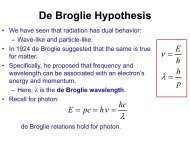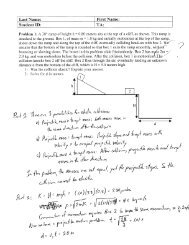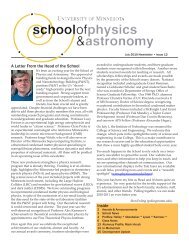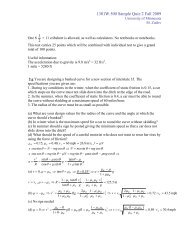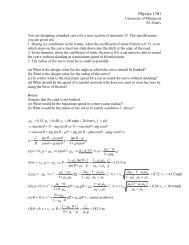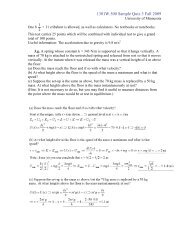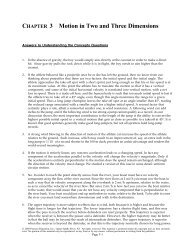1301W.500 SYLLABUS - School of Physics and Astronomy ...
1301W.500 SYLLABUS - School of Physics and Astronomy ...
1301W.500 SYLLABUS - School of Physics and Astronomy ...
- No tags were found...
Create successful ePaper yourself
Turn your PDF publications into a flip-book with our unique Google optimized e-Paper software.
Lecture: During lectures you will be introduced to fundamental physical concepts <strong>and</strong> shownhow to apply these concepts to solve specific problems. You are expected to read the relevanttextbook chapters before coming to class. You are always invited to think critically about thematerial presented, ask questions <strong>and</strong> clarifications whenever needed. It is important that youunderst<strong>and</strong> the material presented since it will be required to underst<strong>and</strong> concepts introducedlater on.In-class questions (ICQ): From time to time during lectures you will be asked several short,multiple choice questions. Your answers will be collected using a responder system. You willtypically have 1 minute to answer each question. These will be graded as follows: correct – 2points, incorrect – 1 point, no answer – 0 points. It is your responsibility to make sure that yourresponder is set up correctly (e.g., programmed with your student ID) <strong>and</strong> functions properly(e.g., has fresh batteries). A user manual is posted on the class website.Laboratory: Because this course satisfies University requirements as a laboratory science class<strong>and</strong> as a writing intensive course, you must pass the laboratory (60% <strong>of</strong> the possible marks)to receive a passing grade in the course; note that your use <strong>of</strong> English <strong>and</strong> your grammar areimportant. As well as this, the laboratory grade will be based on well thought out predictions,collaborative skills as evidenced by effective group work, <strong>and</strong> a well organized <strong>and</strong> correctlywritten technical communication <strong>of</strong> the physics concepts <strong>of</strong> this course in your laboratory journal<strong>and</strong> laboratory reports. The specific part <strong>of</strong> the laboratory for which you will write a report willbe assigned to you by your instructor at the end <strong>of</strong> each laboratory topic (about every two-threeweeks). Reports should be about 4-5 typed pages including all necessary predictions, graphs,data tables, <strong>and</strong> calculations. Use <strong>of</strong> a word processor is required <strong>and</strong> such facilities are suppliedby the University. Reports must be given to your laboratory instructor for grading no morethan one week after they are assigned. Late reports will not be accepted. Graded reports willbe returned to you not later than your next laboratory meeting <strong>and</strong> may be revised, only withinstructor permission, to achieve a higher grade. If a revised report is allowed, it must be given toyour laboratory instructor within 2 days. Details <strong>of</strong> the laboratory grading are in your laboratorymanual. All the laboratory problems have sections called Prediction <strong>and</strong> Method Questions. Youshould h<strong>and</strong> in your answers to these sections to your TA by 5 PM two business days beforethe laboratory takes place. (Your TA will assign the lab problems during the previous laboratorymeeting.) To ensure that you have a conceptual introduction to the physics <strong>and</strong> math conceptsneeded for beginning the lab, you will take a quiz every week, except the first, on the web(http://myu.umn.edu/) to test your preparation for the lab. No one will be allowed to participatein the laboratory unless they have passed the web-based laboratory preparation quiz forthat topic. It is an open book, open note quiz which may be taken as <strong>of</strong>ten as necessary but mustbe passed at least one hour before your scheduled laboratory session; it does not counttowards your final grade. Because <strong>of</strong> the limited number <strong>of</strong> computers available, make sure totake this quiz at least the day before your lab meets. A passing grade is 75%; if you fail to passthe quiz after two attempts, get help. Failure to participate in the laboratory will result in alaboratory grade <strong>of</strong> 0 for that topic. Since the laboratory involves teamwork, no laboratorymakeup will be allowed except in situations <strong>of</strong>ficially recognized by the University. In that case,the laboratory work must be made up by arrangement with your instructor before your next3




